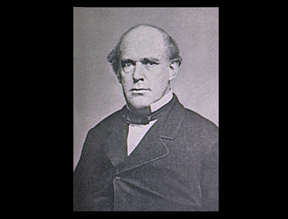![]()

Salmon Chase was born in 1808 in New Hampshire. His family could trace its American origins to the early years of Massachusetts settlement in the seventeenth century. The eighth of eleven children of a tavernkeeper and local officeholder, Chase received his early education in a local district school and a private institution.
When Chase was nine years old, his father died, and the youth was placed under the care of an uncle, who was the Protestant Episcopal bishop of Ohio. Receiving secular and religious training in Ohio, he enrolled at Cincinnati College where his uncle was president. He remained there only a short time before entering Dartmouth College, from which he was graduated in 1826. Chase moved to Washington, D.C., where he conducted a school and studied law under the guidance of the prominent politician, William Wirt. He was admitted to the bar in 1829.
Returning to Ohio in 1830, Chase settled in Cincinnati, where he practiced law, entered into antislavery and other reform activities, and engaged in writing and lecturing. His religious and moral impulses led him to defend a number of escaped slaves in local as well as federal courts, including the Supreme Court. Initially a Whig, Chase helped form the antislavery Liberty Party, and became one of its leaders. Later, following the Mexican War, he helped form the Free Soil Party, which was dedicated to the non-expansion of slavery. A coalition of Free Soilers and Democrats in Ohio elected Chase to the United States Senate in early 1849, and he used his position to protest measures such as the Compromise of 1850 and the Kansas- Nebraska Act as subversive of freedom and liberty. His "Appeal of the Independent Democrats," following passage of the Kansas-Nebraska Act, was a classic expression of protest against a slave power conspiracy to nationalize slavery.
When the Republican Party began to form in the aftermath of the Kansas-Nebraska Act, Chase was an early proponent. He was elected governor of Ohio in 1855 and 1857, and United States senator in 1860. His long antislavery record and party activism led Chase to be prominently mentioned as a Republican presidential candidate in both 1856 and 1860. But widespread support failed to materialize, and at the Republican convention in 1860, Ohio cast its lot with Lincoln, placing Chase in a favorable position for a cabinet post when Lincoln was elected. When Lincoln appointed him secretary of the treasury, Chase resigned his Senate seat and served as Treasury secretary from 1861 until July 1864.
As secretary of the treasury, Chase presided over the complex and difficult task of financing the war; he was instrumental in establishing the national banking system in 1863. But his more radical antislavery views, as well as political ambition, put him at odds with the more moderate Lincoln. Eventually, in 1864, Lincoln accepted Chase's resignation because, as Lincoln said, they had reached a point of "mutual embarrassment" in their official relations. Nevertheless, when Supreme Court Chief Justice Roger Taney died in October of that year, Lincoln appointed Chase to the position. It was he who administered the presidential oath to Andrew Johnson following Lincoln's assassination.
Although an advocate of black suffrage and Radical Reconstruction measures, Chase encountered opposition from the Republican Party's radical wing during Johnson's presidency. His handling of the Johnson impeachment proceedings in the Senate brought criticism from radicals, and soon Chase's name was mentioned as a possible 1868 Democratic party presidential nominee. But the nomination went to Horatio Seymour of New York. Meanwhile, as chief justice, Chase presided over a court that actively involved itself in a host of key cases dealing with the Civil War, Reconstruction, and government finance. Deteriorating health put a halt to further efforts to promote Chase's political prospects, and in 1873, he died of a paralytic stroke.